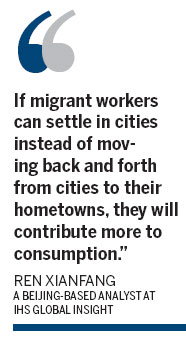Fast urbanization set to drive consumption
Updated: 2012-01-18 07:47
By Lan Lan (China Daily)
|
|||||||||
Historic population shift sees city dwellers outnumber rural residents
BEIJING - China's urbanization rate surpassed 50 percent for the first time ever last year, and city dwellers' growing purchasing will help boost consumption and the nation's economic transformation, said analysts.
Urban residents accounted for 51.27 percent of the population in 2011, up 1.32 percentage point from 2010.
The increasing number of urbanites offers huge potential for consumption as the average income of urban residents is about triple that of rural people.
The nominal per-capita income of urban residents rose about 14 percent last year, the National Bureau of Statistics (NBS) said on Tuesday. The agency said that the nominal per-capita income of rural residents rose about 18 percent.
Nominal incomes aren't adjusted for inflation, which was 5.4 percent in 2011.
Wen Tiejun, dean of Renmin University of China's School of Agricultural Economics and Rural Development, noted that in China, the definition of urban residents includes migrant workers who have worked in cities for more than six months.
The number of migrant workers rose 4.4 percent to 252 million in 2011, and they have become a major force behind expanding consumption, said analysts.
"If migrant workers can settle in cities instead of moving back and forth from cities to their hometowns, they will contribute more to consumption," said Ren Xianfang, a Beijing-based analyst at IHS Global Insight.
But that means the government must pay more attention to migrant workers' welfare and development, the analysts said.
|
|
They said that consumption remained critical to economic growth in 2012, and domestic demand could get a boost from a combination of higher incomes, lower taxes and new stimulus programs to expand household consumption.
More than half of China's growth in 2011 was driven by domestic consumption, even as external demand slumped.
As the global economy grappled with crises and downturns, Chinese leaders have stressed the role of domestic demand in recent economic meetings.
Consumption accounted for 51.6 percent of China's growth in 2011, while gross capital formation accounted for 54.2 percent, both of which offset the negative 5.8 percent contribution of net exports, the NBS said on Tuesday.
Ma Jiantang, head of the NBS, said China wanted a more balanced contribution from investment and consumption, since the current model based on high investment growth was unsustainable, given the massive consumption of resources.
Jing Ulrich, chairman of global markets for China at JP Morgan Chase & Co, said the government's priority in 2012 would be to maintain stable economic growth and launch more stimulus measures to propel domestic consumption and investment in social programs.
Shanghai began to replace its turnover tax with a value-added tax in the transport sector and some service sectors from Jan 1, and such moves are expected to help boost consumption.
Also, the government is expected to slash high import duties on luxury goods, to cater to wealthy local consumers, she said.
China Daily

 Relief reaches isolated village
Relief reaches isolated village
 Rainfall poses new threats to quake-hit region
Rainfall poses new threats to quake-hit region
 Funerals begin for Boston bombing victims
Funerals begin for Boston bombing victims
 Quake takeaway from China's Air Force
Quake takeaway from China's Air Force
 Obama celebrates young inventors at science fair
Obama celebrates young inventors at science fair
 Earth Day marked around the world
Earth Day marked around the world
 Volunteer team helping students find sense of normalcy
Volunteer team helping students find sense of normalcy
 Ethnic groups quick to join rescue efforts
Ethnic groups quick to join rescue efforts
Most Viewed
Editor's Picks

|

|

|

|

|

|
Today's Top News
Health new priority for quake zone
Xi meets US top military officer
Japan's boats driven out of Diaoyu
China mulls online shopping legislation
Bird flu death toll rises to 22
Putin appoints new ambassador to China
Japanese ships blocked from Diaoyu Islands
Inspired by Guan, more Chinese pick up golf
US Weekly

|

|








